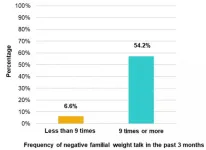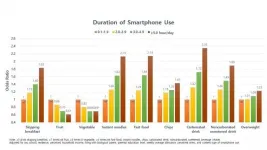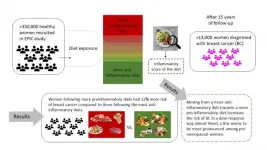How kids eat: Five new insights on daily habits and childhood obesity
Studies reveal how family, social media and COVID-19 influence children's diets and health
2021-06-07
(Press-News.org) Rockville, Maryland (June 7, 2021) -- What we eat during childhood can affect the health of individuals--and populations--for years to come. As rates of childhood obesity continue to rise, five studies being presented at NUTRITION 2021 LIVE ONLINE bring new insights into the diets of children and teens around the world.
Families report substantial child weight gain during COVID-19
Researchers at Virginia Commonwealth University surveyed over 400 parents about their children's weight and eating habits before the COVID-19 pandemic and at two points during the pandemic. About 30% of parents reported that their child had gained weight during the initial months of COVID-19, with an average increase of 9.6 pounds between May and September 2020 (the researchers were unable to tease out how much of this was excess weight gain beyond normal growth). While there were no clear patterns in the types of foods families reported having at home, the surveys revealed shifting concerns and parenting behaviors surrounding children's eating habits. Families who reported child weight gain also reported feeling an increased, and sustained, concern about their child's weight and efforts to monitor and restrict their child's eating across both pandemic timepoints. Families whose children did not gain weight also reported similar initial concerns and efforts to monitor and restrict eating, yet these did not increase as much or were more temporary and returned to pre-pandemic attitudes and practices by September 2020. To mitigate the potential long-term health consequences, researchers say public health efforts are crucial to helping families resume more healthful pre-pandemic child feeding practices and healthy lifestyle behaviors, particularly for children who have experienced weight gain during this time.
Elizabeth Adams will present this research in an on-demand session during NUTRITION 2021 LIVE ONLINE from noon on Monday, June 7 through 5:30 p.m. on Friday, June 10 (abstract; presentation details). Image available.
Children internalize family members' negative comments about weight
Research from the Tufts University Friedman School of Nutrition Science and Policy suggests that teasing or critical comments about weight from family members can lead children to apply negative weight-based stereotypes to themselves, known as weight bias internalization. The researchers surveyed 137 parents and their 9-14 year-old children about the number of times children experienced teasing or critical comments about their weight from family members and children's weight bias internalization. About 30% of children were overweight or obese and 15% had moderate to high levels of weight bias internalization. Children exposed to negative weight talk from parents or siblings on nine or more occasions over a three-month period were eight times more likely to have moderate or high levels of weight bias internalization than those exposed to negative weight talk less frequently or not at all. Previous studies have linked weight bias internalization with self-devaluation, low self-esteem, poor body image and disordered eating behaviors.
Katherine Rancaño will present this research in an on-demand session during NUTRITION 2021 LIVE ONLINE from noon on Monday, June 7 through 5:30 p.m. on Friday, June 10 (abstract; presentation details). Image available.
Snacks account for much of the junk food in teens' diets
A study by researchers at Temple University reveals that snacks account for a high proportion of the least healthy foods teens eat in a day. In a survey of more than 6,500 U.S. adolescents age 12-19, snacks between meals accounted for two-thirds of the recommended daily limit of added sugar and about one-third of daily limits for solid fats and refined grains, on average. These proportions were highest among teens with obesity. Snacks accounted for more total calories and a higher proportion of daily calories among those with obesity or overweight. Teens with obesity consumed an average of 204 more calories from snacks each day compared to teens with normal weight. The findings demonstrate that snacking is a key contributor to nutrient-poor calories from added sugars in the diets of U.S. teens, according to researchers.
Christina Croce will present this research in an on-demand poster session during NUTRITION 2021 LIVE ONLINE from noon on Monday, June 7 through 5:30 p.m. on Friday, June 10 (abstract; presentation details).
Young people around the world report barriers to healthy eating
What drives food choices among young people? To find out, researchers at Western Sydney University collaborated with UNICEF teams and enrolled 655 adolescents age 12-18 to participate in workshops simultaneously conducted in 18 countries across five world regions. The workshops, led by facilitators from UNICEF, were designed to elicit insights into young people's experiences and perceptions. Across all countries, participants identified family, social media and the internet as primary drivers of their food choices, followed by television and radio, friends, branding and advertising and celebrity endorsements. Key barriers to healthy eating related to financial constraints; taste; and the types of food available at home, at school and in the community, with many reporting that unhealthy foods are typically easier to access. Participants suggested that young people themselves should play a role in designing solutions to encourage healthier choices.
Catharine Fleming will present this research in an on-demand poster session during NUTRITION 2021 LIVE ONLINE from noon on Monday, June 7 through 5:30 p.m. on Friday, June 10 (abstract; presentation details). Images available.
Tracking what European children eat in a day
The daily patterns of what we eat can shed light on a population's overall diet and health. In a study led by researchers at the Dr. von Hauner Children's Hospital of Ludwig-Maximilians-Universität Munich in Germany, scientists analyzed what was on the plates of 740 children between the ages of 3-8 years in five European countries. The results show a consistent daily pattern of three meals and two snacks. Children consumed most of their dietary energy, protein and fat at lunch and dinner, while most carbohydrates were provided with snacks and breakfast. Snacks and dinner each accounted for about one-quarter of overall calories; lunch accounted for about 30% of calories and breakfast accounted for about 18%. Italian children consumed the lightest breakfasts and were the least likely to have a morning snack. Spanish children showed higher than average fat and protein intakes at all eating occasions. Overall, the results suggest the diets of European children followed a traditional, stable pattern with some country-specific differences, researchers said.
Vanessa Jaeger will present this research in an on-demand poster session during NUTRITION 2021 LIVE ONLINE from noon on Monday, June 7 through 5:30 p.m. on Friday, June 10 (abstract; presentation details). Image available.
INFORMATION:
NUTRITION 2021 LIVE ONLINE is the flagship online meeting of the END
[Attachments] See images for this press release:

ELSE PRESS RELEASES FROM THIS DATE:
2021-06-07
Rockville, Maryland (June 7, 2021) -- Even moderate smartphone use may influence teens' diet and weight, according to a new study of more than 53,000 Korean adolescents. Teens who used a smartphone for more than 2 hours per day were significantly more likely to eat more junk food and fewer fruits and vegetables than those spending less time on their phone. Teens spending more than 3 hours per day on a smartphone were significantly more likely to be overweight or obese.
"While earlier studies have shown that TV watching is an important factor that increases the risk of obesity in children and adolescents, little is known about the effects of modern screen time such as smartphone use on diet and obesity," said Hannah Oh, ScD, assistant professor at ...
2021-06-07
Rockville, Maryland (June 7, 2021) -- Studies being presented at END ...
2021-06-07
Rockville, Maryland (June 7, 2021) -- A new study of more than 350,000 women found that women with diets incorporating more foods that increase inflammation in the body had a 12% increase in their risk of breast cancer compared to women who consume more anti-inflammatory diets. The new findings are being presented at NUTRITION 2021 LIVE ONLINE.
The study authors found that moving from a more anti-inflammatory diet toward one that increases inflammation upped breast cancer risk in an almost linear manner. Foods that increase inflammation include red and processed meat; high-fat foods such as butter, margarines and frying fats; and ...
2021-06-07
Rockville, Maryland (June 7, 2021) -- What did Americans eat during the Great Recession? A new study suggests dietary quality plummeted along with the economy.
According to the study, adults overall ate more refined grains and solid fats and children increased their intake of added sugar during the recession. The impacts of the downturn were especially pronounced in food-insecure households, where individuals significantly reduced their intake of protein and dark green vegetables while increasing total sugars.
"Overall, we found that the Great Recession had a negative impact on dietary ...
2021-06-07
Rockville, Maryland (June 7, 2021) -- There has been a long-standing debate as to whether a low-fat or a plant-centered diet is better at lowering the risk of cardiovascular disease. A new study that followed more than 4,700 people over 30 years, found that a plant-centered diet was associated with a lower long-term risk for cardiovascular disease. However, both diets were linked with lower LDL, or bad cholesterol, levels.
"Since 1980, dietary guidelines in the United States and in Europe have recommended eating low amounts of saturated fat because of the high rates of heart disease in these regions," said research team leader David Jacobs, PhD, from the University of Minnesota. "This is not necessarily wrong, but our study shows that plant-centered ...
2021-06-07
Rockville, Maryland (June 7, 2021) -- As COVID-19 spread throughout the world, our daily routines and behaviors changed drastically. A new study of more than 2,000 people in the U.S. found that the pandemic has also affected how we eat. The authors found a decrease in the consumption of many food groups, particularly healthy foods such as vegetables and whole grains, compared to before the pandemic.
"When the pandemic began, we saw panic buying, problems in the food supply chain, increases in food prices and rising unemployment rates," said Caroline Um, PhD, a postdoctoral fellow at ...
2021-06-07
Concerned youths worldwide today delivered a policy vision for policy-makers to address the declining state of the world's ocean.
A carbon neutral economy, preserving biodiversity, achieving sustainable seafood production, and reforming ocean governance are the four fundamental pillars supporting policy recommendations debuted in the Global Blue New Deal, an ocean policy framework built around crowd-sourced youth priorities.
"Healthy oceans are essential to human survival and well-being, and environmental health must be a global priority as we recover from the pandemic and build a sustainable blue economy," says Mark Haver, Chair of the Sustainable Ocean Alliance's Youth Policy Advisory Council.
He and 14 fellow Young Ocean Leaders ...
2021-06-07
During his time at EPFL under the Erasmus program, Romain van Wassenhove came up with an idea for a connector that could be used to make modular structures out of sustainable bamboo rather than wood, plastic or metal. "I wanted to focus my Master's on a topic that had meaning to me and that would lead to a concrete application," he says. "Working with bamboo was something I already had in mind while I was studying in Brussels." His connectors can be 3D-printed in biosourced plastic and are customizable to the type of material used for the structure.
Van Wassenhove got the idea for his connector during a class at EPFL on composite materials and developed the concept further through his Master's project, co-directed at EPFL by Senior Scientist Anastasios Vassilopoulos and by associate ...
2021-06-07
Scientists from the University of Graz (Austria), Skoltech and their colleagues from the US and Germany have developed a new neural network that can reliably detect coronal holes from space-based observations. This application paves the way for more reliable space weather predictions and provides valuable information for the study of the solar activity cycle. The paper was published in the journal Astronomy & Astrophysics.
Much like our life on Earth depends on the light of the Sun, our electronic "life" depends on the activity of our closest star and its interactions with Earth's magnetic field. For the ...
2021-06-07
Carbon loss in Canadian peatland is projected to increase by 103 per cent under a high emission scenario, according to new research led by scientists from the University of Waterloo.
The results of the study, which was published today in Nature's Communications Earth & Environment journal, reinforces the urgent need for a comprehensive understanding of peatlands as evolving sources of atmospheric CO2 in a warming world.
Peatlands, which are a type of wetland, are some of the most valuable ecosystems globally. In addition to their role in preserving biodiversity and minimizing ...
LAST 30 PRESS RELEASES:
[Press-News.org] How kids eat: Five new insights on daily habits and childhood obesity
Studies reveal how family, social media and COVID-19 influence children's diets and health







